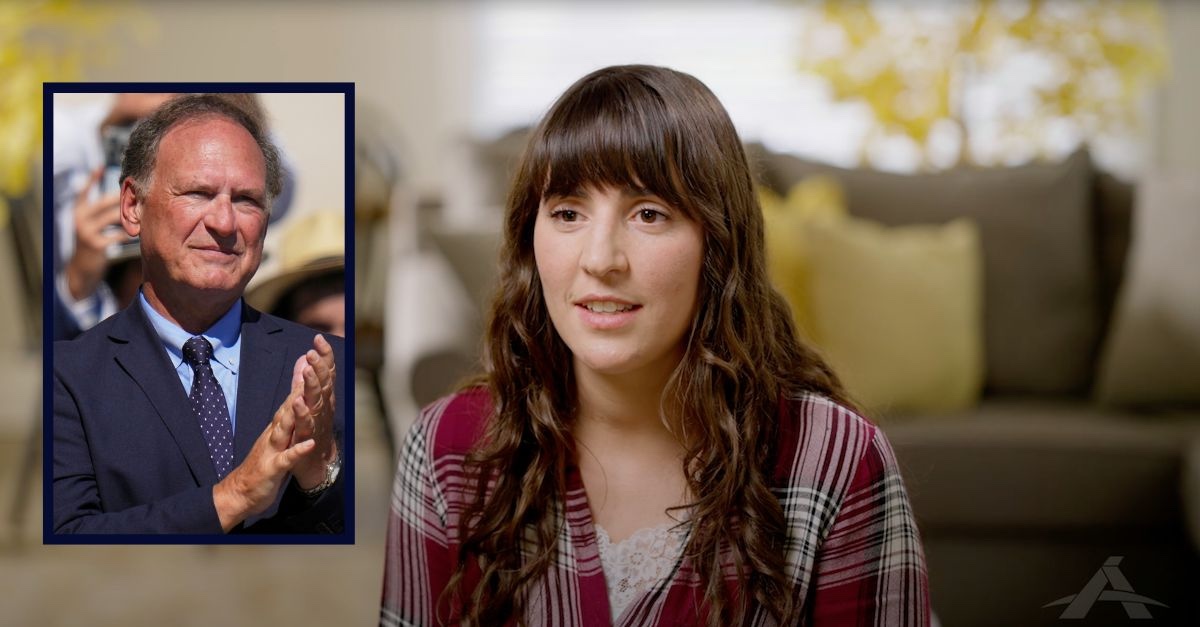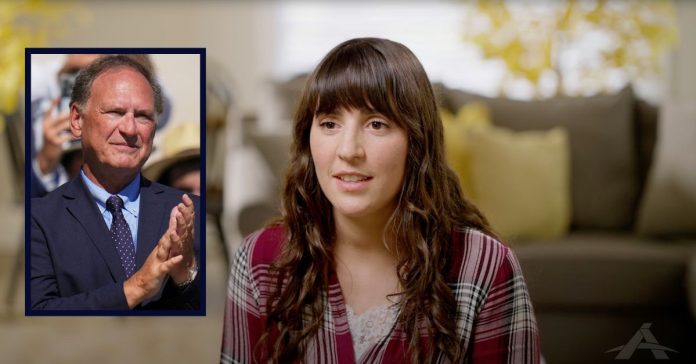
Main: Kaley Chiles, a Christian talk therapist in Colorado, speaks about her case (Alliance Defending Freedom/YouTube). Inset: Supreme Court Justice Samuel Alito attends Pope Leo XIV”s audience for operators of justice in St. Peter’s Square at the Vatican, Saturday, Sept. 20, 2025 (AP Photo/Alessandra Tarantino).
A licensed Colorado talk therapist told the U.S. Supreme Court on Tuesday that a state conversion therapy ban is “viewpoint-based censorship” that violates her First Amendment right to counsel minor clients according to their wishes.
In a case that could upend at least 20 other states’ outlawing of the practice on the basis of harm and ineffectiveness, Justice Samuel Alito was quick to warm to Kaley Chiles’ arguments.
Chiles’ petition was brought by the Alliance Defending Freedom (ADF), the conservative Christian law firm that brought and won a case in favor of a website designer who claimed Colorado “forced” her to support same-sex marriage. ADF also represented Jack Phillips, the Colorado baker who won after refusing to make a transition anniversary celebration cake for a transgender lawyer and refusing to make a cake for a gay couple’s wedding.
And now ADF lead attorney Jim Campbell has told justices that the Colorado law at issue is unconstitutional “censorship” because it “bans voluntary conversation” between a licensed professional and a client under the age of 18 experiencing “unwanted” same-sex attraction or gender dysphoria — under the threat of disciplinary action.
Justice Sonia Sotomayor was clear from the outset on her view that Chiles doesn’t have a case for standing because the Minor Conversion Therapy Law of 2019 has been on the books for roughly six years with no enforcement and, just as important, the state has “disavowed” enforcement against her.
Sotomayor then pressed Campbell for an answer on what Chiles’ talk therapy entailed.
As Campbell began describing a piece of it, Sotomayor shot back, “I don’t want an aspect.”
“Define your talk therapy,” she said, before again demanding: “Counselor, please answer my question.”
Campbell explained that Chiles’ work is solely speech, and that it’s her right to talk about realigning a client’s identity with their biological sex or reducing unwanted same-sex attraction and behavior.
“She engages in a discussion where she and the clients explore the concepts of identity” according to the client’s and their parents’ wishes, the attorney said.
Sotomayor then asked again: If the state disavows enforcement, doesn’t that mean you lack standing, because there is no threat of harm to Chiles?
Campbell, citing anonymous complaints recently filed against Chiles, maintained that there is still a threat.
Frustrated by the “vicious cycle” of argument, Sotomayor again stated “there has to be a threat of prosecution,” and that a “chilling effect doesn’t exist” here.
Love true crime? Sign up for our newsletter, The Law&Crime Docket, to get the latest real-life crime stories delivered right to your inbox
As the justice referred to studies that conclude conversion therapy is emotionally harmful and significantly ups the risk of suicide attempts, she asked whether states could ban therapists from encouraging anorexic patients to vomit.
Campbell answered that the hypothetical showed an obvious encouragement of harm, whereas Chiles’ discussion is in an area of “debated science.”
Justice Ketanji Brown Jackson called Chiles’ case a “little puzzling,” struggling with the notion that a therapist acting as Chiles describes is doing so in a First Amendment capacity, when she is licensed and, therefore, subject to regulation by the state.
Then, said Jackson, one must consider that more than 20 other states have conversion therapy laws that are bases on studies and medical consensus.
Campbell said again that the fact Chiles solely engages in talk therapy is what makes her practice, and the protection of it, different.
“Ms. Chiles is being silenced,” Campbell said, claiming there is ongoing “irreparable harm.”
He added that the studies “suffer from significant flaws” because they “lump together voluntary conversations with shock therapy.”
Justice Samuel Alito picked up from here during the grilling of Colorado Solicitor General Shannon Stevenson, as Stevenson supported a state’s right to regulate the professionals it licenses while relying on a “mountain of evidence” as to the harms of conversion therapy.
After Stevenson said the law “applies only to treatments” and “does not interfere with any speech,” Alito openly showed his disagreement based on the “plain text” of the statute and a hypothetical.
“What if an adolescent male goes to a licensed therapist, says he has same-sex attraction but feels guilty or uneasy and wants to end or lessen those feelings, is that banned?” he asked.
Stevenson began to answer that the state wouldn’t undertake enforcement in that scenario, but Alito cut her off for lack of a clear yes or no.
“Is that banned or is that not banned?” he asked again, before noting that the statute bans “efforts to change” sexual orientation and “behaviors or gender expressions” or “eliminate or reduce” same-sex attraction or feelings.
“How can you square your interpretation with the plain meaning of the statute?” Alito said. “That’s just not the way language works.”
Alito then flipped the hypothetical: What if an adolescent male goes to a licensed therapist and says he has same-sex attraction but wants to feel more comfortable with his sexual orientation?
If that’s permitted but Chiles’ approach isn’t, “that looks like blatant viewpoint discrimination,” Alito said.
Alito suggested that if the statute on its face reads to prohibit, under threat of disciplinary action, what Chiles wants to express, then the state’s lack of an enforcement threat isn’t enough for Colorado to win the day.
When Stevenson emphasized that the “standard of care” is “reasonably determined,” based on studies and medical consensus, Alito pushed back again.
“Your argument depends very heavily on the standard of care,” as tethered to medical consensus, Alito remarked, before asking if there have been times where medical consensus has been “politicized” and overtaken by “ideology.”
Stevenson replied that the law doesn’t stop sharing an opinion about conversion therapy, but regulates attempts to change gender identity or sexual orientation.

